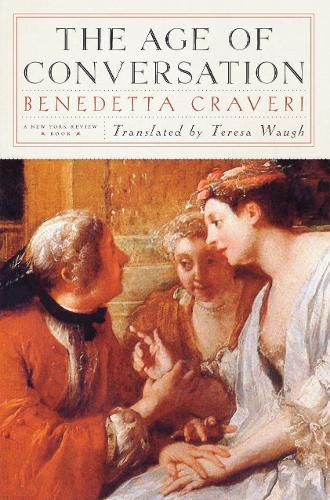
The Age Of Conversation
(Paperback, Main)
Publishing Details
The Age Of Conversation
By (Author) Benedetta Craveri
New York Review Books
NYRB Collections
15th August 2006
Main
United States
Classifications
General
Non Fiction
Social and cultural history
Gender studies: women and girls
305.4896094409033
Physical Properties
Paperback
508
Width 154mm, Height 229mm, Spine 28mm
704g
Description
In the seventeenth and eighteenth centuries, between the reign of Louis XIII and the Revolution, the French nobility of the ancien regime turned their energies to developing the art of sociability, a refined code of manners, and an ideal of gallant, spirited conversation that became a model for social and intellectual life. Benedetta Craveri's history of this leisured, worldly society begins in the 1620s with the celebrated Blue Room of the Marquise de Rambouillet, one of the first in a long series of women who resided over conversations among nobles, writers, prelates, and diplomats. The women Craveri profiles played a significant part in the development of new literary forms such as the novel and the maxim, the codification of language, taste, and behavior, and debates over religion, philosophy, and science. Some, like Madame de Lafayette and Madame de Stael, were gifted writers themselves. Some were involved in the major events of their time, like the Grande Mademoiselle and the Duchesse de Longueville during the Fronde rebellion. Later, the Marquise de Lambert, Madeame de Tencin, and Julie de Lespinasse opened their salons to intellectuals such as Fontenelle, Montesquieu, d'Alembert, and Diderot, thus helping to spread the ideas of the Enlightenment. In demonstrating the diversity of these women's accomplishments, Benedetta Craveri brings to life this brilliant, vanished culture that perfected the pleasure of living. In her pages, the world of La Rochefoucauld, Louis XIV, and Voltaine, of Jansenism, preciosity, Mlle de Scudery's literary portraits, and Mme de Sevigne's letters, appears in all its fascinating complexity.
Reviews
"Craveri, an Italian professor of French literature, argues that the Marquise de Rambouillet fomented a revolution when she offered her famed salon as a place for the French nobility to gather in the early 17th century. This entertaining book explores a golden age of conversation in France (from 1610 to 1789), in which the aristocracy established a new order, away from the strictures of the royal court." --The New York Times Book Review
Craveri argues that when, in the sixteen-twenties, the Marquise de Rambouillet offered her home as a place for the French nobility to gather she was unwittingly fermenting a revolution. The next century and a half constituted the golden age of conversation, which allowed the aristocracy to establish a new order, based not on the strictures of church or crown but on manners. Craveris narrative paints a series of brilliant portraits of those (mostly women) who presided over the new sphere.The New Yorker
Benedetta Craveri's The Age of Conversation is a well-researched study of the French salonthe book offers shrewd portraits of intellectual society's leading ladies, or salonnires, and of the world they created[Craveri's] book is essential for understanding the world of the salon and the reasons for its appeal to so many writers and statesmen.The Wall Street Journal
In her thoughtful book, Craveri...draws effectively on the vast range of recent scholarship in this field, which is listed and discussed in a substantial and extremely useful bibliographical essay. But the main part of the book is not so much a study as an attractive story, written in a style unburdened by academic language.The New York Review of Books
Craveri has resurrected in tantalizing, inviting detail the supreme age of talk embodied in the great salons of Parisand the fascinating women at the center of those salonsWith an effortless grasp of the complex period that starts with the reign of Louis XIV and ends with the murder of Louis XVI in the Revolution, Craveri easily insinuates us into this world and its compelling figures.The Los Angeles Times
"EntertainingCraveri, an Italian professor of French literature, helpfully highlights the most influential, literate and scandalous of these irrepressible women.The New York Times
Craveris summary essay on the seduction, deception, and power of the spoken word shows how this movement among Frances noble classes laid groundwork for the coming revolution.Booklist
Author Bio
Benedetta Craveri is a professor of French literature at the University of Tuscia, Viterbo, and the Istituto Universitario Suor Orsola Benincasa, Naples. She regularly contributes to The New York Review of Books and to the cultural pages of the Italian newspaper La Repubblica. Her books include Madame du Deffand and Her World and La Vie privee du Marechal de Richelieu, and Amanti e regine: Il potere delle donne. She is married to a French diplomat.
